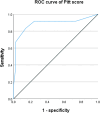Clinical Predictors of Bacteremia Outcome After Initial Empirical Antimicrobial Therapy in Patients with Hematological Malignancies: A Retrospective Analysis
- PMID: 38828373
- PMCID: PMC11141567
- DOI: 10.2147/IDR.S451320
Clinical Predictors of Bacteremia Outcome After Initial Empirical Antimicrobial Therapy in Patients with Hematological Malignancies: A Retrospective Analysis
Abstract
Objective: We performed a retrospective analysis to investigate the clinical predictors of bacteremia outcome involving Escherichia coli (E. coli) and Klebsiella pneumoniae (K. pneumoniae) after initial empirical antimicrobial therapy among hematological malignancy cases.
Methods: This retrospective study was conducted between April 2018 and April 2023. All bloodstream infections (BSIs) caused by E. coli and K. pneumoniae in hospitalized hematological malignancy (HM) patients were identified. Data on patient demographics, clinical characteristics, empirical antimicrobial treatment, outcomes and the antimicrobial susceptibility were collected from medical records. Multivariate analyses were utilized to assess the risk factors for all-cause mortality within 28 days and carbapenem resistance. Optimal cutoffs for continuous predictive variables were evaluated by receiver operating characteristic (ROC) curve analysis.
Results: Among 61 individuals diagnosed with bacteremia, 39 cases were caused by E. coli bacteremia, while the remaining 22 were identified as K. pneumoniae bacteremia. Out of these, there were 10 cases of carbapenem-resistant Enterobacteriaceae (CRE) and 12 cases resulted in all-cause mortality within 28 days. Analysis indicated that Pitt score was an independent risk factor for mortality and a cut-off of 2.5 was a reliable predictor with 83.3% sensitivity and 85.7% specificity, respectively. Impaired mental status and elevated body temperature exceeding 38.6°C as well as a procalcitonin (PCT) level over 8.24 ng/mL on the third day (d3) after antimicrobial treatment were identified as independent risk factors for predicting carbapenem resistance.
Conclusion: We found that Pitt score with a cut-off of 2.5 was a reliable predictor for mortality within 28 days in HM bacteremia cases. Impaired mental status and elevated temperature exceeding 38.6°C as well as a procalcitonin (PCT) level over 8.24 ng/mL on d3 after antimicrobial treatment were identified as predictive risk factors to carbapenem resistance.
Keywords: antimicrobial resistance; initial clinical response; mortality; risk factors.
© 2024 Gao et al.
Conflict of interest statement
The authors declare no conflicts of interest in this work.
Figures
Similar articles
-
Risk Factors for Mortality and Outcomes in Hematological Malignancy Patients with Carbapenem-Resistant Klebsiella pneumoniae Bloodstream Infections.Infect Drug Resist. 2022 Aug 4;15:4241-4251. doi: 10.2147/IDR.S374904. eCollection 2022. Infect Drug Resist. 2022. PMID: 35959146 Free PMC article.
-
Initial empirical antibiotics of non-carbapenems for ESBL-producing E. coli and K. pneumoniae bacteremia in children: a retrospective medical record review.BMC Infect Dis. 2022 Nov 21;22(1):866. doi: 10.1186/s12879-022-07881-7. BMC Infect Dis. 2022. PMID: 36404302 Free PMC article.
-
Epidemiology, Risk Factors, and Clinical Outcomes of Bloodstream Infection due to Extended-Spectrum Beta-Lactamase-Producing Escherichia coli and Klebsiella pneumoniae in Hematologic Malignancy: A Retrospective Study from Central South China.Microb Drug Resist. 2021 Jun;27(6):800-808. doi: 10.1089/mdr.2020.0033. Epub 2020 Nov 24. Microb Drug Resist. 2021. PMID: 33232654
-
Bloodstream infections due to extended-spectrum beta-lactamase-producing Escherichia coli and Klebsiella pneumoniae: risk factors for mortality and treatment outcome, with special emphasis on antimicrobial therapy.Antimicrob Agents Chemother. 2004 Dec;48(12):4574-81. doi: 10.1128/AAC.48.12.4574-4581.2004. Antimicrob Agents Chemother. 2004. PMID: 15561828 Free PMC article.
-
Bloodstream infections caused by Klebsiella pneumoniae: prevalence of blaKPC, virulence factors and their impacts on clinical outcome.BMC Infect Dis. 2018 Jul 31;18(1):358. doi: 10.1186/s12879-018-3263-x. BMC Infect Dis. 2018. PMID: 30064360 Free PMC article.
References
-
- Kang CI, Chung DR, Ko KS, Peck KR, Song JH. Risk factors for infection and treatment outcome of extended-spectrum β-lactamase-producing Escherichia coli and Klebsiella pneumoniae bacteremia in patients with hematologic malignancy. Ann Hematol. 2012;91(1):115–121. - PubMed
LinkOut - more resources
Full Text Sources
Miscellaneous



